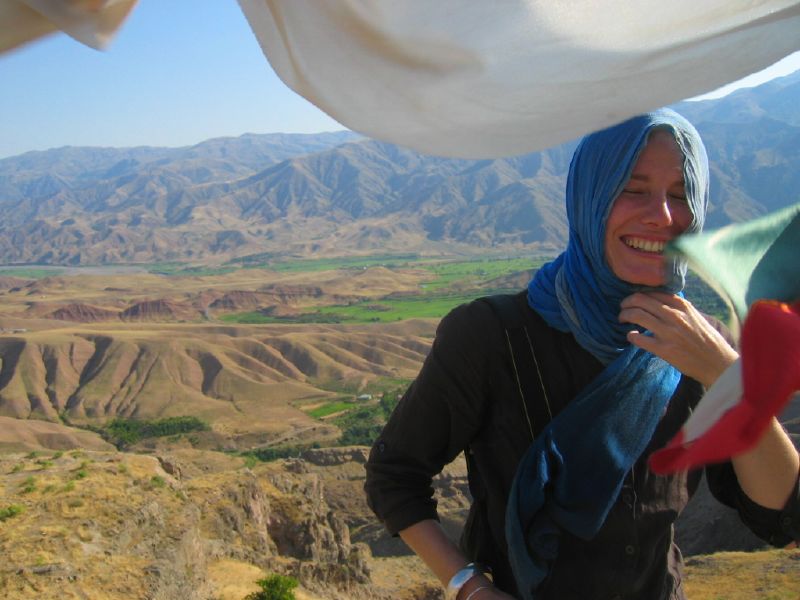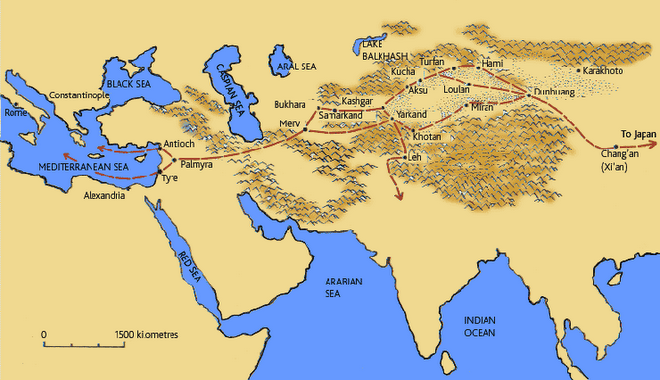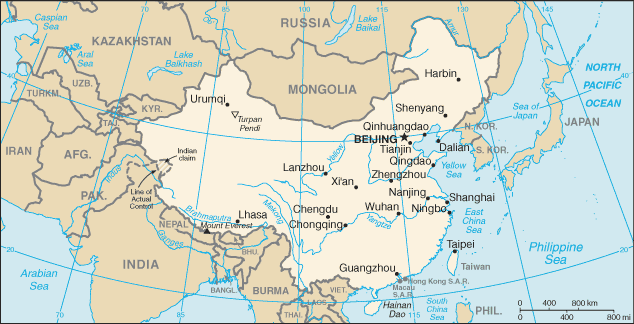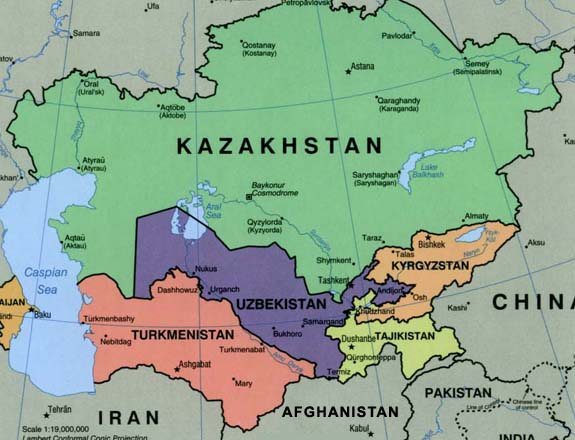Altyn Oimok
The Golden Thimble, Bokonbaevo, Issyk Kul Oblast, Kyrgyzstan
Bokonbaevo is a ghost of a town. It is a wide, vast, quadratic series of dusty streets, about 5 km south of the blue shores of Lake Issyk Kul. It is a dot on the cracked and pot-holed highway leading around the lake and onward to Bishkek. Here the economic crisis is palpable and real. no factories, no industry. no work. The only light in town comes from sunlight bouncing off the new mosque’s metallic cupola and minaret – a gift from Turkey. Contrasting the first dreariness of Bokonbaevo’s sad streets is the abrupt beauty of the Tian Shan, whose peaks rise just beyond the town – but even the mountain’s proud shadows seem to want to hide the degradation of the shamble town. Bokonbaevo seems a scar in the exquisite natural scenery.
It is here that Janyl has created her Altyn Oimok (Golden Thimble) – a burst of color and texture.
The story of Altyn Oimok starts in 1996. The collapse of the Soviet Union has seeped deep into the population of Bokonbaevo, the economic crisis sinking into the population’s bones like the chills of a humid winter. The women in Bokonbaevo are united in hardship. So many of their men – husbands, sons, and brothers - have succumbed to the depression of chronic irremediable unemployment, many drowning their sorrows in vodka. The once tight-knit threads of family structure are being stretched thin.
It’s about this time that three of the town’s women decided to unite together to fight unemployment and revive the pride and strength of their communities. Determined, the women want to fight for their families and themselves, to emerge from the shambles of their country’s economy and to revive the honor and pride of their everyday lives. They are ready to put up a fight.
They first attended Aid to Artisans workshops and seminars on business-creation and marketing. From the newly created Central Asian Crafts Support Association (CACSA), the offspring of Aid to Artisan’s work in the region, they learned how to make high-quality standard products that could target foreign markets, tourists, and later even American soldiers at the Manas Airbase in Bishkek.
Today, in 2007 Altyn Oimok has been busy making handicrafts for 12 years. They have 16 full-time staff in their office and workshop, and 35 women who work with them from their homes. Their market has been focused on the tourists who come to enjoy the blue of of Lake Issyk Kul, but in 2004 with the help of CACSA they exported their first products to Canada. Their products include both traditional felt handiwork such as Shyrdaks and Ala Kiyiz, as well as new products designed for the tourist and foreign markets such as felt slippers, necklaces and small souvenirs.
This success is not a surprise when you meet Janyl. There’s just something in the light of her eyes. a cool reassuring calm. a determination. Janyl, wearing a colorful scarf on her head, is a woman of clear stature. She is gentle and speaks calmly but firmly. She is deeply invested in her community.
Hers is Social Entrepreneurship
Altyn Oimok has worked with the most vulnerable women in Bokonbaevo, gathering, training and employing single mothers, women from poor families, women who have been physically abused. Janyl says that many unemployed women who feel powerless or lost come to find work with her organization. “They become empowered and strong here,” Janyl says. “We give them a chance to develop their skills, to gain financial autonomy and respect within their families and the community.” Altyn Oimok’s business is clearly engaged in community building and in bringing positive social change.
This is Janyl’s clear and simple passion: to return the respect of daily life and beauty to her community. She is a social warrior. simply. resolutely.
Janyl says, “In our village, making handicrafts is the only income-generating activity that can be done while also staying at home and taking care of our families.” Altyn Oimok’s business model, which follows the “Kyrgyz Model” (described in the introductory blog article), enables women to contribute financially to their family’s well-being, while still enabling them to be present in their households.
Janyl takes us inside the homes of some of the women who work with her – she is welcomed as an old friend. a partner. There is clear respect. Working with Altyn Oimok has not only helped the women contribute to their family’s income, but has created a clearly united group of women. a community.
Janyl has many plans for expanding the reach and breadth of Altyn Oimok’s work. She dreams of building a children’s daycare within the workshop, enabling more women to come and work with her, and enabling them to work over-time when they receive large orders. She also wants to build a training center where women can learn about new craft design, models, and marketing. She wants to encourage women to start their own organizations and wants to help in the skill-building.
Janyl also has very business-minded goals, which include making Altyn Oimok a big profit-generator with a more regular market.
Up until today, Altyn Oimok has been vulnerable to seasonal market variations. This is due both to the seasonal nature of market demand (tourism) and the seasonal production of raw ingredients (sheep are sheared in spring, felt is made in summer). Summer is the best time for felt production, which is currently done outside (Altyn Oimok only has a small interior workshop), and dried in the summer sun.
Janyl would like to get the necessary equipment and work space to be able to make the felt continuously throughout the year. She also dreams of incorporating pressing equipment for the felt-making, which would reduce the labor-intensive process and enable her to produce more of the raw materials (felt) the organization uses to make their crafts.
…
Here, in Kyrgyzstan, it seems that even the direst situations can be transformed: the lights are out in the Bishkek night, but it helps to see the stars.





No comments:
Post a Comment